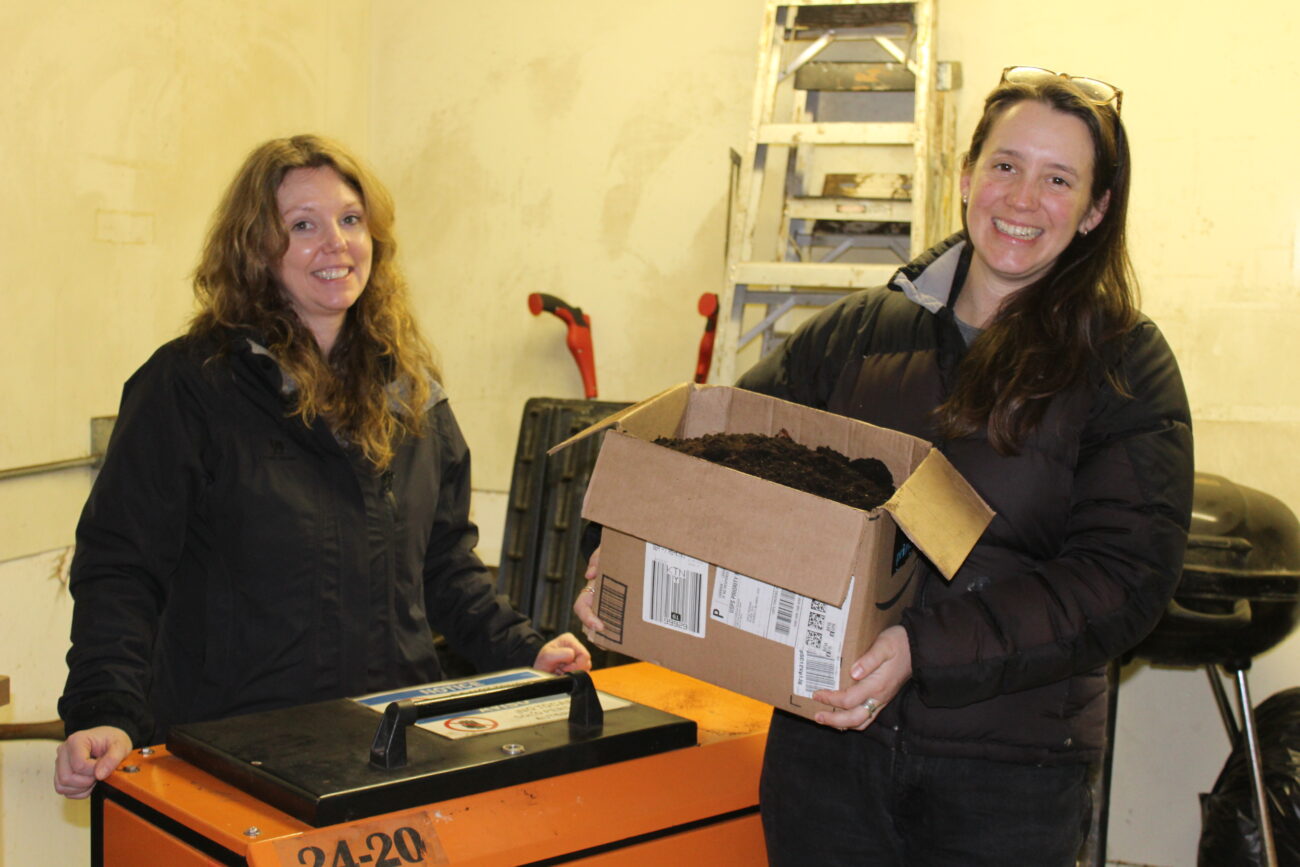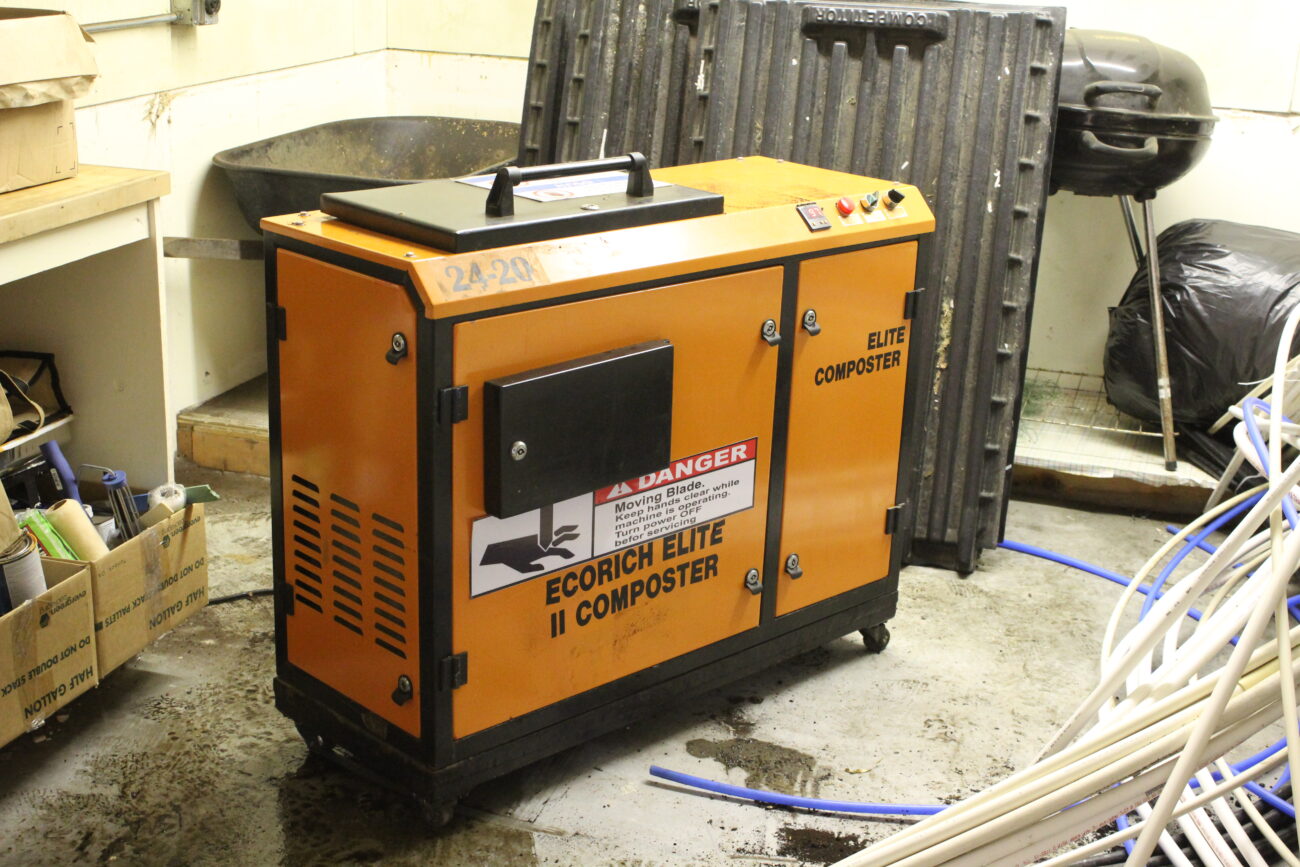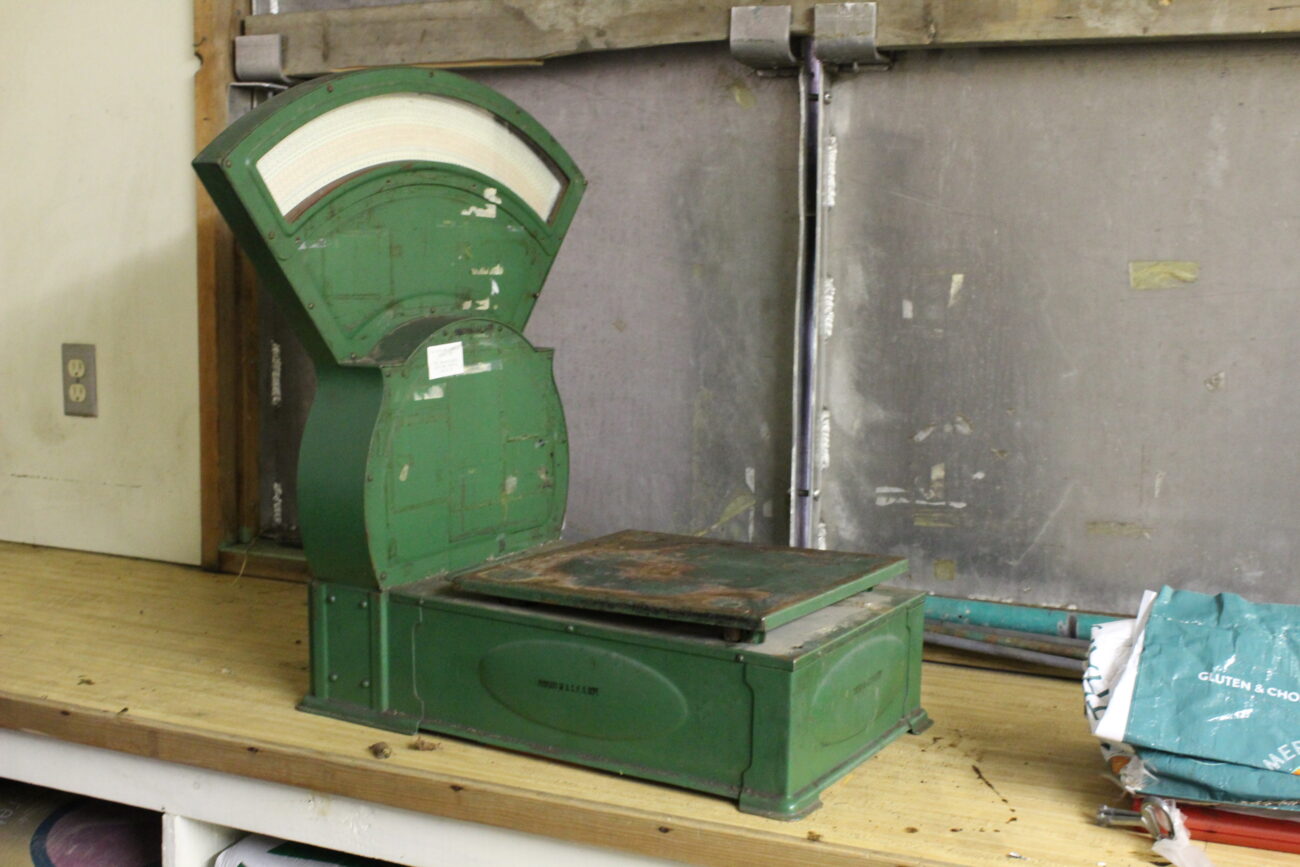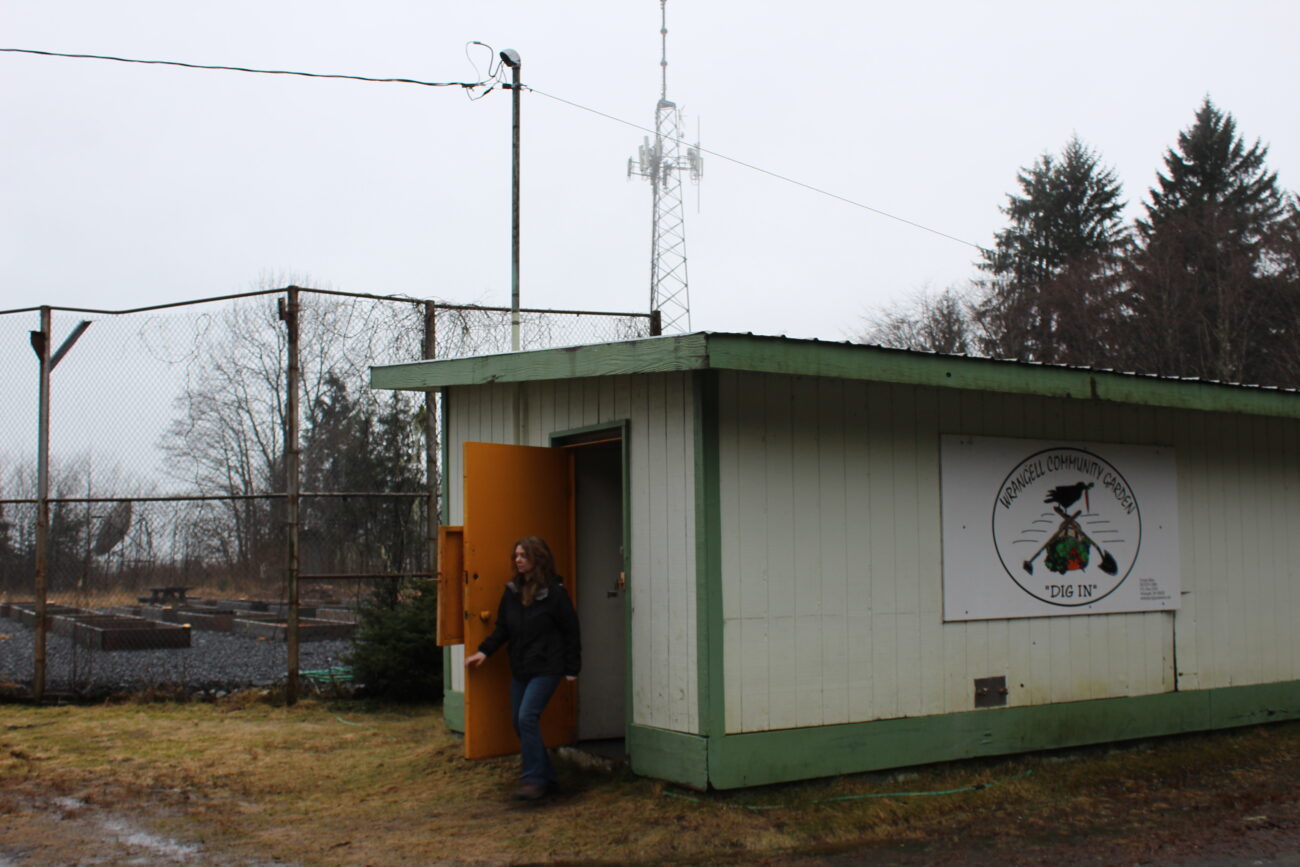
(Sage Smiley / KSTK)
Shipping trash off-island is expensive in Southeast. Wrangell’s tribal environmental office is piloting a new composting program it hopes will eventually help reduce those costs, and help local gardens grow as well.
Years ago, Wrangell’s community garden was a baseball field. Now, cedar planter boxes fill the diamond in neat rows, and the old concession stand is packed with gardening supplies and a … powerful smell.
“It smells like a really healthy granola bar,” Val Massie says with a laugh. She’s the Indian General Assistance Program (IGAP) coordinator for the Wrangell Cooperative Association. “But like too healthy. So strong.”
“It’s got a little bit of a funk,” agrees Kim Wickman, the IGAP Tech for WCA.
Massie and Wickman make up the two-person environmental office of Wrangell’s Tribal government. They’ve helped lead the resurgence of Wrangell’s Community Garden, fueled by a group of committed locals and a $17,000 grant from the state. Much of that money went to purchasing a small community composting machine – the source of the smell – which has taken up residence in the old concession stand.
The machine is about the size of an airline snack cart, but bright orange with black trim. Called the Eco-Rich 20, it weighs about 400 pounds and can turn 20 pounds of food waste into around two pounds of compost in a day.

(Sage Smiley / KSTK)
“If you think of the three bears like Baby Bear, Mama Bear and Papa Bear: Papa Bear is like an industrial massive, like municipal hottest heat, kind of composting machine,” Massie explains. She says Wrangell’s machine is a Mama Bear. Heat, but not as hot. It’s a step up from the other community composting system – or Baby Bear – which uses a slow, years-long outdoor process called “cold composting.”
Wickman walks through how the machine works.
“Your first step would be making sure the inside of your machine is clean and clear and there’s nothing wrapped up around the blades,” she says, “And then you’re going to want to add about 20 pounds of compost.”
She uses an old Wrangell Post Office scale to weigh out food scraps.
“We put it in the machine, you close the machine, you go to the back, turn on the breaker, come back out and hit the start button,” she continues, “And it makes all sorts of lovely noise and some funky smells and scares everybody. And 24 hours later, you have compost. Sometimes. Sometimes 28 hours, maybe 30.”
The end product is a box of soft, dark compost that needs to sit – or “cure” – for a few weeks.
“It’s got a beautiful color to it,” Wickman says, holding up a box of completed compost. “It doesn’t smell [bad].”
Massie agrees.
“It smells earthy,” she says, “It smells good, like when you sit down in the woods in the summer and it just smells like nice, fresh earth. It doesn’t smell bad or gross or anything. It just smells clean and Rich.”
As Wickman explains, there are two big reasons composting food waste is important on an island like Wrangell. One is what makes up Wrangell itself: the island has terrible soil.
“Compost is a wonderful additive we can start building up around,” Wickman says. “The more we compost and the more we can have, in theory, the healthier soil we can have which makes people who consume the foods that are grown in it a healthier type of person.”
The other reason, she says, is rooted in a survey that the tribe carried out about four years ago that found that almost half of Wrangell’s trash could be composted.

(Sage Smiley / KSTK)
“All of our trash leaves the island, so we pay horrible amounts of shipping to get our food here, we consume our food and then we pay horrible amounts of shipping to get it out of here,” Wickman explains, “Where it gets loaded onto a barge, it goes into a truck, it goes onto a train and it ends up in [Washington] somewhere.”
“This can help cut some of that weight,” Wickman continues. “[If] we start cutting some of that weight, hopefully we can start cutting some of our cost, we start cutting our carbon footprint from sending all these things out, while also giving the community soil. So it could really be a win-win in all aspects.”
Cutting down on shipped waste could be a big financial boon to Wrangell’s 2,100 residents. Every barge container of trash shipped south costs thousands of dollars. Almost a quarter of the sanitation department’s budget goes to shipping and processing garbage.
Wickman says the tribe called a lot of compost machine users before purchasing the machine, and they all said the same thing: “It’s kind of a trial by fire: you need to get the machine running to see what you’re going to balance your machine.”
Creating compost is somewhat of an art. There’s got to be the right balance of dry and wet ingredients – carbon-rich dead material and nitrogen-rich living material. So the IGAP office is setting up a compost collection program, with the hope that it will help them learn the ropes and yield some compost – and some data.
“We just want to get some good numbers to kind of figure out how much we can handle and how much it could produce,” Wickman explains.
Twenty Wrangell residents are part of the compost collection pilot. They’ve been given buckets with instructions for what can and can’t go in the machine. Yes to fish bones, veggie scraps, and eggshells. No to large bones or compostable bags. Compost gets picked up on the participants’ normal trash day.
Artist Mad Hesler is one of those twenty.
“I’m a gardener so compost is great for my garden,” Hesler says, “And it would be sweet for there to be more compost in this community for us gardeners to use, because soil is really expensive here.”
She’s been collecting compost to drop off at the slow, cold-composting site at the community garden for years, but says she was excited to join the pilot. The way she sees it, if composting is more accessible, more Wrangellites will give it a try.
“I’m always forgetting to bring my compost there, So I’m like: ‘Great, I’ll be part of this,’” Hesler laughs, “And I also want this to continue to be a thing. I want the community – or the tribe, I guess – to know that people are interested in this. I mean, there’s so much food waste on this island. We can’t recycle or anything, so we might as well be able to compost our food scraps.”
For now, the program is free, and there aren’t plans to monetize it in the immediate future. For now, the compost and data are currency enough.

(Sage Smiley / KSTK)
Massie says she and Wickman have also consulted extensively with other Southeast communities, many of which have their own types of composting programs. In Petersburg, it’s focused on local fish waste and alder trimmings.
“I think in Southeast, we’re kind of situated to be the most pro-composting,” Massie says. That’s because it’s one of the best options for sustainably using waste. It’s too wet – and most Southeast communities are too small – for landfills. Shipping trash is expensive and bad for the environment. Plus, she says, composting mimics a natural process.
“We’re just trying to get our trash back to the way it’s been for thousands of years here, which is full circle,” Massie says. “This looks a little different, it looks more robotic, but that’s what happens in the forest and the ocean, naturally. This is how we’re trying to re-divert that waste stream.”
While Wrangell’s composting program started with some faithful cold-compost users, more people and more compost is the end goal.
“It is the way of the future. It’s the way of the past. And now we just have to make it the present,” Massie says, “That’s the only missing piece. So that’s what we’re trying to do.”
The first couple of weeks of the compost pickup pilot program have been a little bumpy – the Mama Bear machine blew out a blower fan, which paused pickups for a couple of weeks. But with the fan soon to be fixed, Massie and Wickman say they’re ready to get back to grinding.
Anyone in Wrangell who’s interested in joining the waitlist for the community composting pilot program can contact the WCA IGAP office at 907-874-4304.
Get in touch with KSTK at news@kstk.org or (907) 874-2345.











